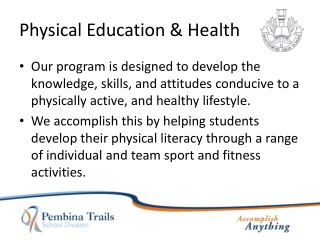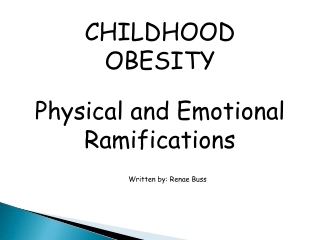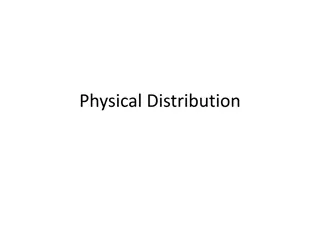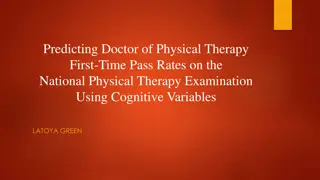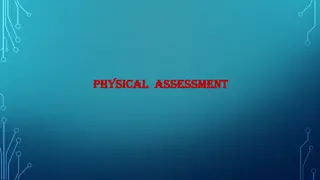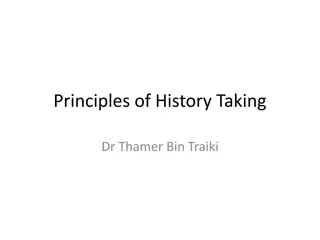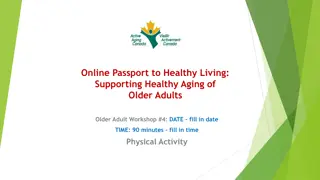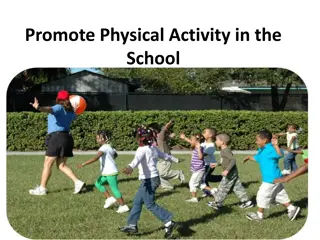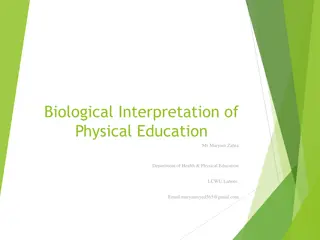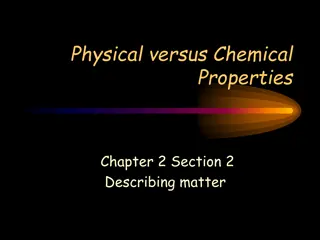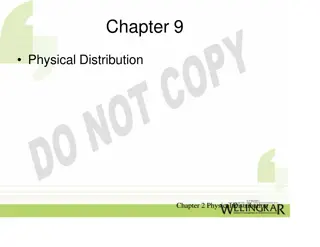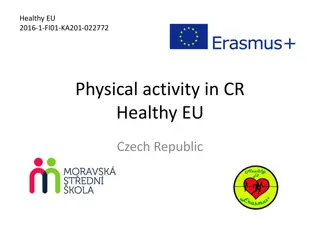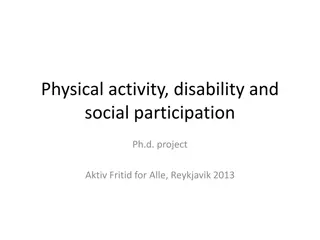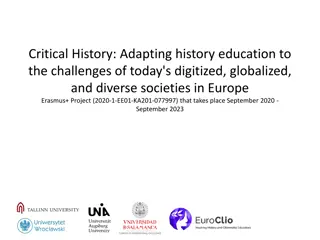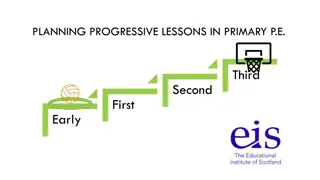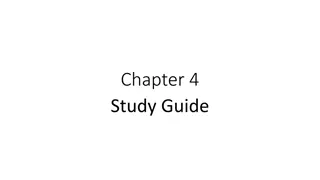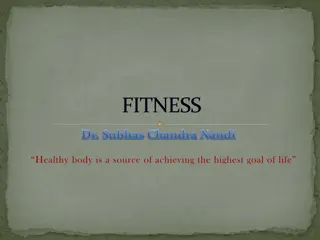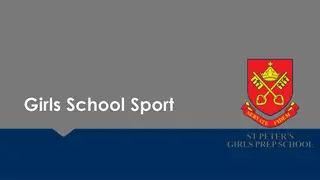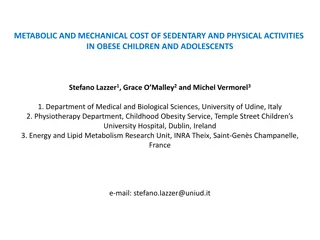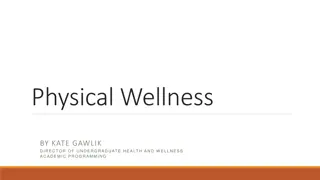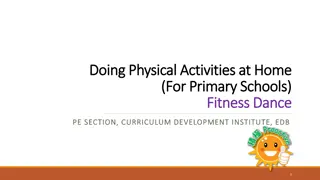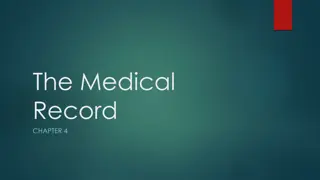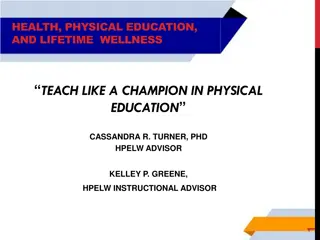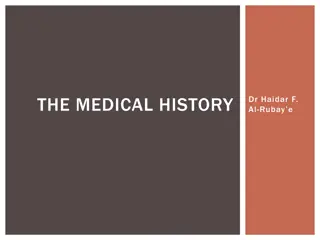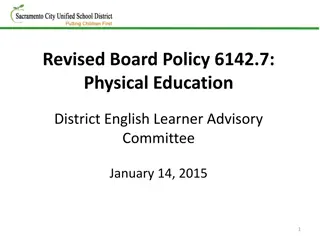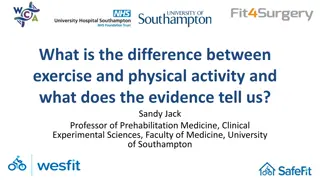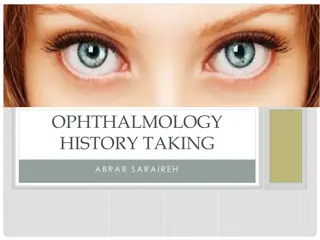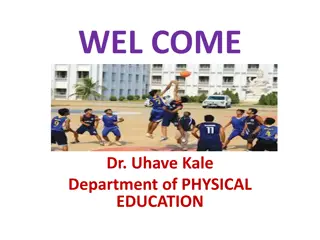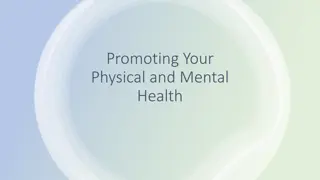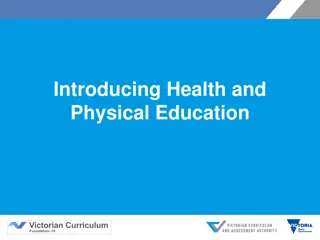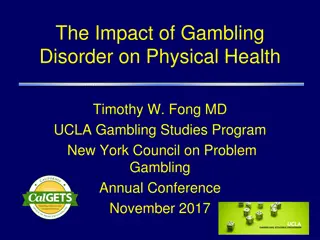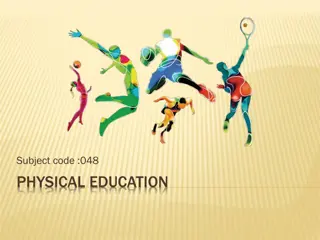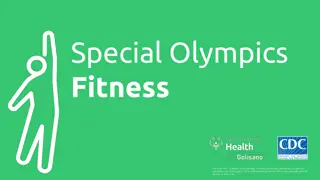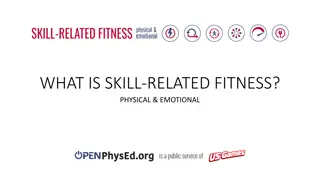Physical Education & Health
Our Physical Education and Health program focuses on developing physical literacy, mental health awareness, and responsible behaviors for students to lead a healthy lifestyle. With a holistic approach, we offer a wide range of activities, integrated health topics, and access to facilities like the A
1 views • 9 slides
Understanding Childhood Obesity: Physical and Emotional Impact
Explore the physical and emotional ramifications of childhood obesity, addressing key culprits like poor nutrition and lack of physical activity. Discover strategies to decrease childhood obesity, improve wellness, and enhance academics by integrating physical and nutrition education. Gain insights
6 views • 33 slides
Physical Distribution
Physical distribution is a critical aspect of business operations involving the planning, implementation, and control of the flow of goods from origin to consumer. Philip Kotler and William J. Stanton have defined physical distribution as a process of managing the movement of goods to meet consumer
0 views • 8 slides
Exploring the Meaning and Definitions of Physical Education
Physical education involves systematic training and instruction related to physical activities for the development and maintenance of the human body. It encompasses the growth of physical power, the cultivation of physical skills, and overall enhancement of physical well-being. Various definitions h
9 views • 7 slides
Importance of Fitness Testing in Physical Education
Health-related physical activity (HRPA) stresses the need to view fitness testing as a tool to promote increased physical activity levels rather than an end goal. The focus in school physical education is on equipping youth with the knowledge and skills for lifelong health. Fitness test protocols sh
0 views • 17 slides
Predicting Doctor of Physical Therapy First-Time Pass Rates on the National Physical Therapy Examination
This study by Latoya Green investigates the relationship between cognitive variables such as professional graduate GPA, PEAT, HSRT, and NPTE to predict first-time pass rates on the National Physical Therapy Examination. The Health Sciences Reasoning Test (HSRT) measures critical thinking in a health
2 views • 8 slides
Understanding Physical Examination: Importance and Purpose
Physical examination plays a crucial role in assessing a patient's physical and mental well-being, detecting diseases early, and establishing a good doctor-patient relationship. It involves systematically collecting objective information through examination techniques. The examination helps identify
2 views • 34 slides
Understanding Pharmaceutical Degradation: Types and Factors
Pharmaceutical degradation refers to the process of a formulation in a specific container losing its chemical, microbiological, therapeutic, physical, and toxicological specifications. It can be categorized into physical, chemical, and microbiological degradation. Physical degradation alters the dru
1 views • 50 slides
Principles of History Taking in Clinical Assessment
History taking is a crucial process in patient assessment, aiding in determining the etiology of medical issues. Obtaining an accurate history through proper questioning, active listening, and maintaining a professional appearance is vital for making accurate diagnoses. The history should follow a s
1 views • 35 slides
Supporting Healthy Aging Through Physical Activity: Workshop Highlights
Explore the insights from an online workshop focusing on supporting healthy aging through physical activity for older adults. The workshop covers topics such as increasing awareness of the importance of physical activity, incorporating activities into daily routines, setting goals, and sustaining pr
0 views • 23 slides
Various Branches of History Explored
Explore different branches of history such as Political History, Constitutional History, Parliamentary History, Legal History, Military History, Diplomatic History, and Social History. Each branch delves into specific aspects of the past, shedding light on politics, governance, warfare, diplomacy, a
1 views • 18 slides
Promoting Physical Activity in Island Communities: The Urgent Need for Change
Island communities are facing a crisis of physical inactivity among children, leading to increasing rates of obesity and related health issues. Lack of promotion of physical activity in schools and workplaces is contributing to this problem. Urgent action is required to prioritize daily exercise and
0 views • 21 slides
Benefits of Physical Education: A Biological Perspective
Physical Education (PE) is essential for developing vital skills, knowledge, and attitudes to lead an active and healthy lifestyle, promoting growth, and preventing various health conditions. Regular physical activity strengthens the heart, lungs, and reduces the risk of chronic diseases, emphasizin
0 views • 13 slides
Understanding Physical and Chemical Properties of Matter
Explore the distinction between physical and chemical properties of matter in Chapter 2, Section 2. Physical properties can be observed without changing the substance's identity, such as color and density, while chemical properties require altering the substance to observe characteristics like react
5 views • 20 slides
Understanding Physical Distribution in Marketing
Physical distribution in marketing involves the planning, implementation, and control of the physical flow of materials and goods from production to end-use to meet buyer needs. This process includes logistics management, components like order processing, transportation, warehousing, and inventory m
0 views • 20 slides
Research Work for Physical Activity Statistics in the Czech Republic
The Czech Republic excels in measures of well-being but faces challenges in income and wealth distribution. Research in physical activity statistics focuses on various aspects like strength, speed, mobility, and mental well-being. Initiatives include assessing energy expenditure from basic activitie
1 views • 23 slides
Understanding Participation in Physical Activity among People with Disabilities
The Ph.D. project explores the relationship between engaging in physical activity and various aspects of everyday life for individuals with physical disabilities. It emphasizes the significance of participation in social practices and how it influences both subjective and objective experiences. The
2 views • 34 slides
Enhancing History Education for Today's Societal Needs: Erasmus+ Project 2020-2023
This Erasmus+ project aims to adapt history education to modern challenges by preparing history educators to teach in a way that meets societal demands and incorporates the latest in history didactics. Partners focus on heritage, global dimensions, public history, and the role of the internet. Resul
1 views • 4 slides
Understanding Gynecological History Taking
This guide explores the process of taking a gynecological history, emphasizing the importance of thoroughness and patient permission. From introductions to obtaining consent, the steps involved in gynecological history taking are outlined. Attention is given to the nuances of gynecological versus ge
0 views • 18 slides
Enhancing Primary Physical Education for Holistic Development
Reinforcing the educational significance of Physical Education (P.E.) in primary schools, this resource emphasizes the diverse roles of class teachers in delivering age-appropriate P.E. lessons. It aligns with the Curriculum for Excellence (CFE) and highlights the impact of P.E. progression from ear
0 views • 24 slides
Benefits and Elements of Physical Activity Study Guide
Explore the benefits of physical activity for physical, mental, and social health, as well as the negative effects of a sedentary lifestyle. Learn about the elements of fitness including cardiorespiratory endurance, muscular strength, muscle endurance, flexibility, and body composition. Discover how
0 views • 19 slides
Understanding Physical and Chemical Properties of Matter
Explore the distinction between physical and chemical properties of matter in Chapter 15, Section 2. Learn to classify properties such as color, flammability, odor, shape, taste, density, and more. Understand how physical properties can be observed without altering the substance's identity, while ch
0 views • 17 slides
Understanding Physical Fitness and its Components
Physical fitness encompasses health-related and skill-related components that contribute to overall well-being. Health-related fitness includes muscular strength, endurance, cardiorespiratory endurance, flexibility, and body composition. On the other hand, skill-related fitness comprises speed, agil
0 views • 22 slides
Reimagining Physical Education: A Holistic Approach at St. Peter's Girls Prep School
In the context of St. Peter's Girls Prep School, the philosophy around physical education is explored, emphasizing the integral role it plays in a child's holistic development beyond just playing sports. The approach focuses on instilling healthy habits, balanced nutrition, and physical fitness alon
0 views • 18 slides
Metabolic and Mechanical Cost of Sedentary and Physical Activities in Obese Children and Adolescents
A study by Stefano Lazzer, Grace O. Malley, and Michel Vermorel explores the metabolic and mechanical costs of sedentary and physical activities in obese children and adolescents. The research delves into the main components of daily energy expenditure, the contribution of organs and tissues to body
0 views • 12 slides
Importance of Physical Wellness in Health Maintenance
Physical wellness, as emphasized by Kate Gawlik, involves caring for the body through exercise, healthy eating, stress reduction, and more. Regular physical activity, such as aerobic and muscle-strengthening exercises, offers numerous health benefits, including reducing the risk of chronic diseases
0 views • 13 slides
Encouraging Physical Fitness Activities at Home for Primary School Students
Department of Health emphasizes the benefits of regular physical activities from childhood to adulthood, promoting health and fitness while reducing risks of diseases. The Curriculum Development Institute provides materials to encourage individual physical activities at home for students, with paren
0 views • 16 slides
Understanding Medical Records: History, Physical Examination, and Abbreviations
Medical records play a crucial role in documenting a patient's medical history and findings from physical examinations. The history and physical (H&P) document includes subjective information from the patient and objective observations by the examiner. The history (Hx) record covers personal medical
0 views • 20 slides
Effective Strategies for Teaching Physical Education Like a Champion
Explore key strategies for teaching physical education effectively, focusing on instructional planning, classroom management, and setting clear objectives. Learn how to align teaching practices with the needs of students and develop a portfolio for elementary HPELW teachers. Enhance your skills in l
0 views • 36 slides
Efficient Medical History Taking Guidelines
Medical history taking is a crucial step in diagnosis, involving the patient's account of illness and relevant information. Following a structured framework helps identify potential diagnoses. Key elements include personal information, chief complaint, presenting illness history, review of systems,
0 views • 51 slides
Importance of Physical Education in Education Code and Policies
Revised Board Policy 6142.7 and related documents highlight the significance of physical education in schools, emphasizing its role in improving physical fitness, developing motor skills, and supporting overall student well-being. The Education Code outlines requirements, exemptions, and instruction
0 views • 12 slides
Understanding the Difference Between Exercise and Physical Activity
In this informative content, Professor Sandy Jack explains the distinction between physical activity and exercise. Physical activity involves any movement requiring energy, while exercise is intentional, structured movement aimed at improving or maintaining physical fitness. The evidence supports th
0 views • 12 slides
Ophthalmology History Taking: Importance and Components
Ophthalmology history taking is crucial for identifying and narrowing down differential diagnoses, screening for hidden diseases, and protecting patients from harm. Components include patient profile, chief complaint, history of present illness, past ophthalmic and medical history, drug and family h
0 views • 24 slides
Understanding the Importance of Physical Education and Exercise Science
Explore the contemporary scope of physical education & sport, emphasizing the importance of personal philosophy in this field. Discover goals for physical educators, challenges in promoting physical activity, and the expansion of physical education beyond traditional settings. Understand the impact
0 views • 12 slides
Enhancing Your Physical and Mental Well-being Through Lifestyle Balance
Achieving a lifestyle balance is crucial for promoting your physical and mental health. Focus on nutrition, physical activity, leisure, rest, and reducing risk factors to maintain overall well-being. Educate others, especially children, on healthy food relationships. Incorporate regular physical act
0 views • 8 slides
Overview of Victorian Curriculum - Health and Physical Education
Victorian Curriculum F-10 for Health and Physical Education aims to equip students with essential knowledge, skills, and attitudes for promoting overall wellbeing and physical activity participation. The curriculum focuses on personal, social, and community health, movement and physical activity, an
0 views • 7 slides
Impact of Gambling Disorder on Physical Health: Overview and Strategies
Understanding the impact of gambling disorder on physical health, the presentation by Dr. Timothy W. Fong at the New York Council on Problem Gambling Annual Conference in November 2017 highlighted the importance of office-based strategies. The session covered the traditional and modern definitions o
0 views • 51 slides
Physical Education Eligibility and Curriculum Overview
Explore the eligibility conditions for opting for Physical Education, including medical fitness and sports participation requirements. Dive into the theory and practical components of the curriculum, covering topics such as physical fitness, sports psychology, and biomechanics. The practical aspect
0 views • 7 slides
Special Olympics Fitness: Promoting Health and Performance through Physical Activity
Special Olympics Fitness focuses on providing year-round sports training and athletic competition for individuals with intellectual disabilities, promoting physical fitness, courage, joy, and community connections. The program emphasizes optimal health and performance through physical activity, nutr
0 views • 12 slides
Understanding Skill-Related Fitness: Physical and Emotional Aspects
Skill-related fitness encompasses both physical and emotional components, such as agility, balance, coordination, power, reaction time, and speed. Physical agility involves quick body movements, while emotional agility relates to positive responses in various situations. Physical balance requires we
0 views • 7 slides
